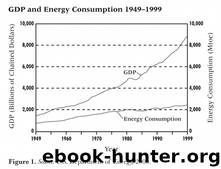Sacred Economics, Money, Gift, and Society in the Age of Transition by Charles Eisenstein

Author:Charles Eisenstein
Language: eng
Format: mobi
Tags: Business & Personal Finance
Published: 2011-09-26T22:00:00+00:00
The Concentration of Wealth
Because economic growth is almost always lower than the rate of interest, what generally happens in such conditions is no mystery. If debtors cannot, in aggregate, make interest payments from the new wealth they create, they must turn over more and more of their existing wealth to their creditors and/or pledge a greater and greater proportion of their current and future income to debt service. When their assets and discretionary income are exhausted, they must go into default. It can be no other way, when the average return on investment is lower than the average interest rate paid to obtain the capital invested. Defaults are inevitable for a certain proportion of borrowers.
In theory at least, defaults are not necessarily a bad thing: they bring negative consequences for decisions that don't further the general good-that is, that don't result in more efficient production of goods that people want. Lenders will be cautious not to lend to someone who is unlikely to contribute to the economy, and borrowers will be under pressure to act in ways that do contribute to the economy. Even in a zero-interest system, people might default if they make dumb decisions, but there wouldn't be a built-in, organic necessity for defaults.
Aside from economists, no one likes defaults-least of all creditors, since their money disappears. One way to prevent a default, at least temporarily, is to lend the borrower even more money so she can continue making payments on the original loan. This might be justified if the borrower is facing a temporary difficulty or if there is reason to believe that enough higher productivity is around the corner to pay back all the loans. But often, lenders will throw in good money after bad just because they don't want to write down the losses from defaults, which could indeed send them into bankruptcy themselves. As long as the borrower is still making payments, the lender can pretend that everything is normal.
This is essentially the situation the world economy has occupied for the last several years. After years, or even decades, of interest rates far exceeding economic growth, with no compensatory rise in defaults, we face an enormous debt overhang. The government, at the behest of the financial industry (i.e., the creditors, the owners of money), has done its best to prevent defaults and keep the full value of the debts on the books, hoping that renewed economic growth will allow them to continue to be serviced.3 We will "grow our way out of debt," they hope.
At the political level, then, the same pressure exists to create "economic growth" as it does on the level of the individual or business. The debtor is under pressure to sell something, if only his labor, in order to obtain money to pay debt. That is essentially what growth-friendly policies do as well-they make this "selling something" easier; that is, they facilitate the conversion of natural, social, and other capital into money. When we relax pollution controls, we ease the conversion of the life-sustaining atmosphere into money.
Download
This site does not store any files on its server. We only index and link to content provided by other sites. Please contact the content providers to delete copyright contents if any and email us, we'll remove relevant links or contents immediately.
The Lonely City by Olivia Laing(4792)
Animal Frequency by Melissa Alvarez(4454)
All Creatures Great and Small by James Herriot(4299)
Walking by Henry David Thoreau(3945)
Exit West by Mohsin Hamid(3814)
Origin Story: A Big History of Everything by David Christian(3679)
COSMOS by Carl Sagan(3612)
How to Read Water: Clues and Patterns from Puddles to the Sea (Natural Navigation) by Tristan Gooley(3453)
Hedgerow by John Wright(3347)
How to Read Nature by Tristan Gooley(3322)
The Inner Life of Animals by Peter Wohlleben(3300)
How to Do Nothing by Jenny Odell(3289)
Project Animal Farm: An Accidental Journey into the Secret World of Farming and the Truth About Our Food by Sonia Faruqi(3208)
Origin Story by David Christian(3191)
Water by Ian Miller(3172)
A Forest Journey by John Perlin(3062)
The Plant Messiah by Carlos Magdalena(2918)
A Wilder Time by William E. Glassley(2852)
Forests: A Very Short Introduction by Jaboury Ghazoul(2828)
